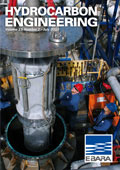Editorial comment
Make no mistake, the Macondo well disaster in the Gulf of Mexico (GOM) is a game changing event. In years to come, the explosion, tragic loss of 11 lives, sinking of the Deepwater Horizon and subsequent catastrophic oil leak will represent a pivotal moment, not just for the offshore drilling industry but the entire energy industry. Environmentally this event will be regarded by the general public as the point at which the industry ‘crossed the Rubicon’. President Barack Obama, has likened the tragedy to the environmental equivalent of 9/11, and with estimates of anything up to 100 000 bpd (at the wilder end of the spectrum) of crude oil still leaking into the GOM every day, it is certainly an unprecedented calamity guaranteed to elicit a torrent of anti oil industry news headlines and rhetoric for months if not years to come.
Register for free »
Get started now for absolutely FREE, no credit card required.
It is unlike previous disasters such as the Exxon Valdez in 1989 when 250 000 bbls of oil were spilt into Prince William Sound in Alaska or the 2005 Texas City refinery explosion, that caused 15 deaths, where there was a clear beginning, middle and end to the events within a relatively defined timeframe. Unfortunately in this instance the denouement remains someway off and is still largely unknown. As a result, the final acts will be played out under the full glare and scrutiny of the world’s media.
President Obama is quite correct in stating that ‘this disaster is going to shape how we think about the environment and energy for many years to come’. The likely repercussions will mean that from a safety, regulatory and environmental perspective, ‘business as usual’ will cease to exist for the oil and gas industry. The world will no longer accept that this type of incident can’t and won’t happen again. ‘Usual’ will be redefined as regulators seek to design all risk out of oil and gas operations and processes. The old mantra of ‘cost control’, long a dominant force across the industry, will inevitably be replaced by ‘risk control’. The result will be an increasingly restrictive operating environment with many layers of regulation and legal directives inevitably leading to project delays and increased costs.
That it could not have come at a worse time for the industry is a facile observation, there would never be a good time for such a disaster. But the fact that it occurred on the back of such a deep global economic recession and in the GOM, the very cradle of the oil and gas industry, is unfortunate in the extreme and will doubtless impact the evolution of deepwater exploration and production technology worldwide. Certainly the disaster is another example of the demise of ‘easy oil’ and the lack of a viable alternative to fossil fuels. Readily available resources are no longer plentiful. Demand for oil and gas is such that oil companies are forced to operate in ever more hazardous environments be they farther offshore or in more hostile regions of the globe. Whilst this demand for oil and gas persists no amount of legislation will negate the fact that this is a frontier industry that operates at the very edge of what is technologically feasible. The industry will certainly move forward from Macondo and become stronger. It will continue to innovate and become safer for both operators and the environment. However, as a result of this crisis, the long term price of oil will increase at a faster rate, the cost of drilling both on and offshore will be greater and once again the game has most certainly shifted in OPEC’s favour.


